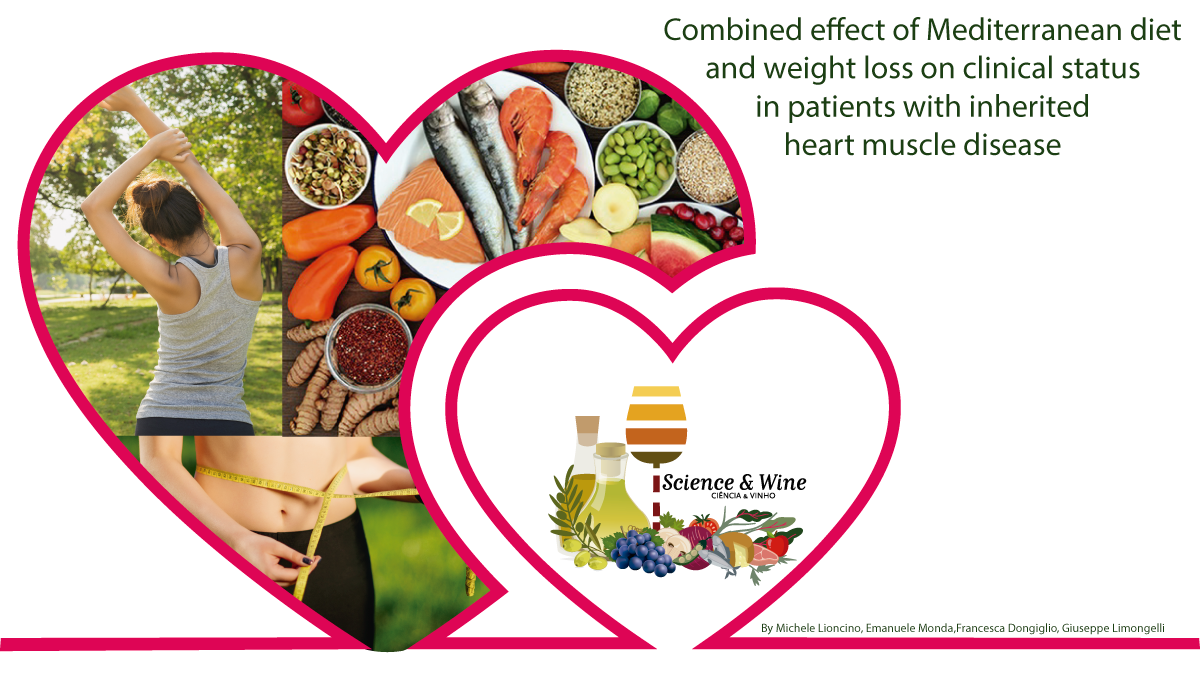By Michele Lioncino, Emanuele Monda, Francesca Dongiglio, Giuseppe Limongelli
Inherited Heart Disease, Department of Translational Medical Sciences, Università della Campania Luigi Vanvitelli, Naples, Italy.*Email: giuseppe.limongelli@unicampania.it or limongelligiuseppe@libero.it
It is well known that reduction in excess calories and behavioral interventions may prevent major cardiovascular adverse clinical events (1). In the recent years, the availability of highly refined sugars and the association with a sedentary lifestyle has caused a dramatic “epidemic” of obesity in developed countries. The nutritional transition to processed food has been the paradigm over the last 30 years, leading to dramatic consequences for the healthcare systems: therefore, the role of lifestyle modifications for primary prevention of cardiovascular disease has become of great interest among researchers.
The cardioprotective benefits of Mediterranean diet, with particular regard to cardiovascular mortality, all-cause mortality, cancer and type 2 diabetes mellitus have been confirmed by many epidemiological studies (2). Interestingly, although Mediterranean populations tend to consume relatively high amounts of fat, they showed unexpectedly low rates of cardiovascular disease, leading to the so called “Mediterranean paradox” (3).
Mediterranean diet is characterized by high consumption of fruit, vegetables, legumes, unrefined cereals, low fat dairy products and monounsaturated fatty acids, mainly derived from olive oil, with low amounts of red meat (often limited to 1-2 times/month). To date, increased consumption of unprocessed meat has been associated to cancer, cardiovascular mortality and insulin resistance (4). Mediterranean model replaces unprocessed meats with other sources of proteins, as fish, poultry and nuts. Moderate alcohol consumption, more specifically red wine, is an essential component of Mediterranean diet and is frequently overlooked as an important part of the meal, being partially responsible for the lower rates of cardiovascular events among Mediterranean populations. Several studies have demonstrated that moderate alcohol consumption is associated to higher levels of high-density lipoprotein cholesterol (HDL-C) and a reduction of oxidative stress (5). In comparison to the intake of other alcoholic beverages, the consumption of red wine might be more cardioprotective, and it has been suggested that these beneficial effects are not solely due to the presence of alcohol but also to the concomitant action of antioxidant compounds present in red wine. Although the polyphenol composition and their exact content may be variable, total polyphenol content seems to be higher in red wine compared with white wines. Resveratrol, anthocyanins, catechins and tannins may improve endothelial function and glucose metabolism, reduce inflammatory markers and exert a positive effect on the circulating levels of low-density lipoprotein-cholesterol (LDL-C), known to be strongly associated to the risk of coronary artery disease (CAD) (6).
To date, while the benefits of Mediterranean diet for the primary prevention of ischemic heart disease is unequivocally accepted, there are not specific dietary recommendations for patients affected by hypertrophic cardiomyopathy (HCM).

HCM is a pathologic condition characterized by an abnormal increase in myocardial wall thickness, that cannot solely be explained by abnormal loading conditions as hypertension or valvular heart disease (7). In adults, up to 60% of the patients harbor a mutation in a sarcomere protein gene. In recent years, interest on clinical significance of obesity among patients affected by HCM is growing. According to a large registry (8), the prevalence of overweight and obesity among HCM patients is disproportionately high compared with general population and may contribute to worsen their clinical presentation. Obese HCM patients are more symptomatic for dyspnea and have a greater incidence of atrial fibrillation, heart failure and adverse outcomes, irrespective of their baseline clinical status. According to American College of Cardiology/ American Heart Association and European Society of Cardiology guidelines (7,9), participation into competitive sports is discouraged in patients with HCM, on the contrary low intensity aerobic exercise is recommended to maintain a healthy lifestyle. Therefore, it is possible that subjective limitation in physical activity may contribute to the spread of obesity among patients affected by HCM.
Our research group conducted a pilot study to assess the effect of combination of Mediterranean diet and aerobic exercise on weight loss and clinical status in 20 obese, symptomatic patients with HCM. Although only 25% of the patients experiences a significant weight loss, according to the prespecified cutoff of a reduction >10% of body weight, the benefits of Mediterranean diet and weight loss were consistent among the population of study. We observed a remodeling of left atrial dimensions and improved exercise capacity. In particular, the improvement of clinical and hemodynamic status was associated to a reduction in the need for surgical procedures and heart transplant. Further studies are needed to assess the role of dietary habits in patients with HCM and other phenocopies, some of which are considered rare and require specific tertiary center assessment.
However, it seems clear that the cardioprotective role of Mediterranean diet is not limited to the primary prevention of coronary events but may exert beneficial effect in other clinical settings, as in HCM and in similar conditions, known as HCM mimics, some of which are classified as rare diseases and require tertiary center assessment.
Read more at: https://doi.org/10.1016/j.hfc.2021.01.003

Michele Lioncino 
Francesca Dongiglio 
Giuseppe Limongelli 
Michele Lioncino graduated in Medicine and Surgery (2018) at University of Campania “Luigi Vanvitelli” with interniship in Human Physiology focused on the roles of orexins in metabolic disorders. Currently, he is a resident in Cardiology at Monaldi Hospital – AORN dei Colli, Naples. From 2015 to 2018 he attended the Internal Medicine Unit at Second University of Naples with particular focus on diagnosis and management of acute bacterial endocarditis.Currently, he’s part of the Inherited and Rare Cardiovascular Disease Team, AORN Dei Colli, Department of Translational Sciences, where he focuses on the diagnosis and clinical management of children and adult patients with cardiomyopathies and congenital heart diseases.
Francesca Dongiglio graduated in Biotechnology (2010) and completed her residency in Human Nutrion (2012), obtaining the professional qualification in the same year. She spent her internship in the Endocrinology and Oncology Department, “Federico II” University of Naples (Naples, Italy), from 2011 to 2012. From 2012 to 2015, she was a clinical and research fellow in the Diabetology and Endocrinology Department, Second University of Naples (Naples, Italy), acquiring clinical skills in 1) the outpatient management of many Internal Medicine diseases; 2) evaluation of the pharmacological distribution of biological drugs in Rheumatological patients employing bioimpedance analysis; 3) evaluation of Cardiovascular risk by body fat distribution analysis through new technology; 4) formulation of specific diets for internal and surgical pathologies; 5) formulation and use of devices for artificial nutrition. From 2016 to 2018, she lectured food education in many primary schools. She is currently a Nutritionist at the Rare and Inherited Cardiovascular Disease Unit, AORN Ospedali dei Colli – Monaldi Hospital, Department of Translational Science, University of Campania “Luigi Vanvitelli” (Naples, Italy).
Giuseppe Limongelli, MD, PhD, FESC. Dr. Limongelli graduated (1997) and completed his Cardiology Training (2001) from the Second University of Naples (SUN). In 2001, he attended the “Master in Nephrology” (SUN). In 2001, he won a four years PhD course in Cardiovascular and Thoracic Sciences and Associated Biotechnology (SUN). From 2002 to 2003, he was attached to St George’s Hospital Medical School (London, UK) as Research Fellow of The Genotyping Lab & Heart Failure Clinic. From 2003 to 2004, he was attached to The University College of London (London, UK) as Research Fellow of The Cobbold Lab (Middlesex Hospital) & Heart Failure Clinic (The Heart Hospital). During his stay in St George’s Hospital, he attended a 6 months “Bioinformatics Half Module” at the Department of Basic Sciences. In 2003, he started an “European Doctorate in Biotechnology” course (HeduBT, UK), with a project on “Clinical and Molecular Aspects of Cardiomyopathies”. He was appointed with the title of “European Doctor in Biotechnology” in 2007. He is currently an Associate professor of Cardiology (since november 2017) at the Department of Translational Science, Università della Campania “Luigi VanvitellI” – Monaldi Hospital (AORN Colli), and Honorary Senior Lecturer (since May 2017) at the the Institute of Cardiovascular Sciences, University College of London, London, UK. His main research interests are clinical and genetic mechanisms of cardiomyopathies and heart failure, congenital, inherited, and rare disease, and athlete’s heart.
References
- Kastorini CM, Milionis HJ, Esposito K, Giugliano D, Goudevenos JA, Panagiotakos DB. The effect of Mediterranean diet on metabolic syndrome and its components: a meta-analysis of 50 studies and 534,906 individuals. J Am Coll Cardiol. 2011 Mar 15;57(11):1299-313. doi: 10.1016/j.jacc.2010.09.073. PMID: 21392646.
- Yu E, Malik VS, Hu FB. Reprint of: Cardiovascular Disease Prevention by Diet Modification: JACC Health Promotion Series. J Am Coll Cardiol. 2018 Dec 11;72(23 Pt B):2951-2963. doi: 10.1016/j.jacc.2018.10.019. PMID: 30522630
- Yarnell JW, Evans AE. The Mediterranean diet revisited–towards resolving the (French) paradox. QJM. 2000 Dec;93(12):783-5. doi: 10.1093/qjmed/93.12.783. PMID: 11110584
- Zeraatkar D, Han MA, Guyatt GH, Vernooij RWM, El Dib R, Cheung K, Milio K, Zworth M, Bartoszko JJ, Valli C, Rabassa M, Lee Y, Zajac J, Prokop-Dorner A, Lo C, Bala MM, Alonso-Coello P, Hanna SE, Johnston BC. Red and Processed Meat Consumption and Risk for All-Cause Mortality and Cardiometabolic Outcomes: A Systematic Review and Meta-analysis of Cohort Studies. Ann Intern Med. 2019 Nov 19;171(10):703-710. doi: 10.7326/M19-0655. Epub 2019 Oct 1. PMID: 31569213.
- Brien SE, Ronksley PE, Turner BJ, Mukamal KJ, Ghali WA. Effect of alcohol consumption on biological markers associated with risk of coronary heart disease: systematic review and meta-analysis of interventional studies. BMJ. 2011 Feb 22;342:d636. doi: 10.1136/bmj.d636. PMID: 21343206; PMCID: PMC3043110.
- Castaldo L, Narváez A, Izzo L, Graziani G, Gaspari A, Minno GD, Ritieni A. Red Wine Consumption and Cardiovascular Health. Molecules. 2019 Oct 8;24(19):3626. doi: 10.3390/molecules24193626. PMID: 31597344; PMCID: PMC6804046.
- Ommen SR, Mital S, Burke MA, Day SM, Deswal A, Elliott P, Evanovich LL, Hung J, Joglar JA, Kantor P, Kimmelstiel C, Kittleson M, Link MS, Maron MS, Martinez MW, Miyake CY, Schaff HV, Semsarian C, Sorajja P. 2020 AHA/ACC Guideline for the Diagnosis and Treatment of Patients With Hypertrophic Cardiomyopathy: Executive Summary: A Report of the American College of Cardiology/American Heart Association Joint Committee on Clinical Practice Guidelines. Circulation. 2020 Dec 22;142(25):e533-e557. doi: 10.1161/CIR.0000000000000938. Epub 2020 Nov 20. PMID: 33215938.
- Fumagalli C, Maurizi N, Day SM, Ashley EA, Michels M, Colan SD, Jacoby D, Marchionni N, Vincent-Tompkins J, Ho CY, Olivotto I; SHARE Investigators. Association of Obesity With Adverse Long-term Outcomes in Hypertrophic Cardiomyopathy. JAMA Cardiol. 2020 Jan 1;5(1):65-72. doi: 10.1001/jamacardio.2019.4268. PMID: 31693057; PMCID: PMC6865784.
- Authors/Task Force members, Elliott PM, Anastasakis A, Borger MA, Borggrefe M, Cecchi F, Charron P, Hagege AA, Lafont A, Limongelli G, Mahrholdt H, McKenna WJ, Mogensen J, Nihoyannopoulos P, Nistri S, Pieper PG, Pieske B, Rapezzi C, Rutten FH, Tillmanns C, Watkins H. 2014 ESC Guidelines on diagnosis and management of hypertrophic cardiomyopathy: the Task Force for the Diagnosis and Management of Hypertrophic Cardiomyopathy of the European Society of Cardiology (ESC). Eur Heart J. 2014 Oct 14;35(39):2733-79. doi: 10.1093/eurheartj/ehu284. Epub 2014 Aug 29. PMID: 25173338.
- Limongelli G, Monda E, D’Aponte A, Caiazza M, Rubino M, Esposito A, Palmiero G, Moscarella E, Messina G, Calabro’ P, Scudiero O, Pacileo G, Monda M, Bossone E, Day SM, Olivotto I.Combined Effect of Mediterranean Diet and Aerobic Exercise on Weight Loss and Clinical Status in Obese Symptomatic Patients with Hypertrophic Cardiomyopathy. Heart Fail Clin. 2021 Apr;17(2):303-313. doi: 10.1016/j.hfc.2021.01.003.Epub 2021 Feb 10. PMID: 33673954

